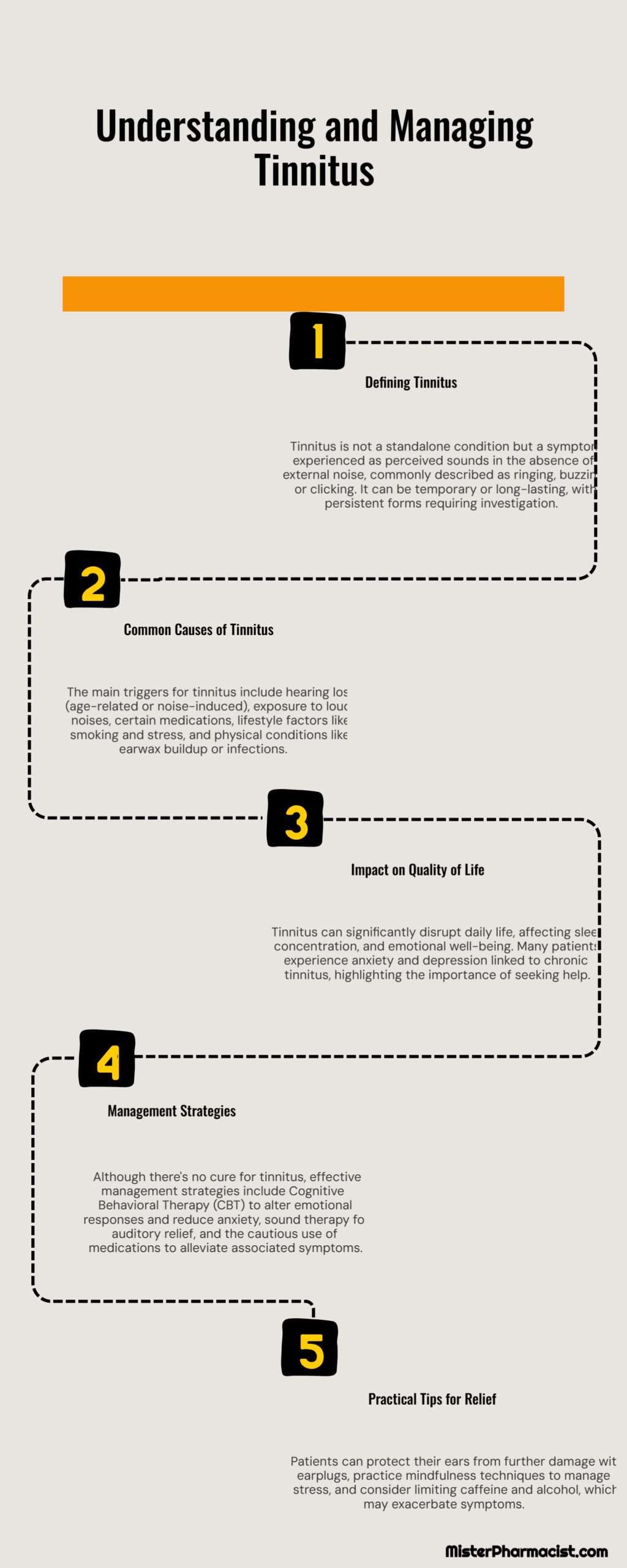Why Your Ears Won’t Stop Ringing: A Deep Dive Into Tinnitus Management
If your ears constantly hum, buzz, or ring, you’re not alone. Tinnitus affects millions worldwide, causing anything from mild annoyance to full-blown frustration. Let’s dive in and uncover what’s behind the noise, what you can do about it, and when to ask for help.
What is Tinnitus?
Tinnitus isn’t a condition—it’s a symptom. It’s when your brain hears a sound that doesn’t exist externally. While many describe it as ringing, others hear buzzing, roaring, clicking, or even humming.
– Short-term tinnitus (e.g., after a concert) often resolves on its own.
– Persistent tinnitus (lasting six months or more) needs further investigation.
Think of tinnitus as a fire alarm—it might not always signal an emergency, but it’s worth checking out the cause.
Patient Story: Meet Sarah
Sarah, a 42-year-old teacher, started noticing a faint ringing in her ears after a stressful week. Thinking it would pass, she ignored it. Months later, the ringing grew louder, interfering with her sleep. Turns out, Sarah’s tinnitus was linked to hearing loss from years of loud music during her university days.
What Causes Tinnitus?
Here are the most common triggers:
- Hearing Loss: Age-related (presbycusis) or noise-induced.
- Loud Noise Exposure: From concerts, occupational noise, or headphones cranked to max.
- Medications: High-dose aspirin, NSAIDs (ibuprofen), certain antibiotics, and cancer drugs.
- Lifestyle Factors: Smoking, high blood pressure, and even stress.
- Others: Earwax buildup, infections, or rare conditions like Meniere’s disease.
How Does Tinnitus Impact You?
Tinnitus isn’t just “noise.” It can disrupt your life:
– Trouble falling asleep due to the constant sound.
– Difficulty focusing at work or enjoying conversations.
– Increased anxiety, depression, or even low self-esteem.
Did you know? Up to 60% of chronic tinnitus patients also struggle with depression. If this resonates, remember: help is available.
Patient Scenario: Alex, a 34-year-old graphic designer, avoided social gatherings because his tinnitus made conversations overwhelming. Cognitive Behavioral Therapy (CBT) helped him regain confidence and taught him how to cope.
Can Tinnitus Be Treated?
Tinnitus has no one-size-fits-all cure, but there are effective management strategies:
-
Cognitive Behavioral Therapy (CBT)
– A game-changer for many patients.
– Focuses on changing your emotional response to tinnitus.
– Bonus: It improves sleep and reduces anxiety.
-
Sound Therapy
– White noise machines, apps, or even fans can help.
– Tinnitus Retraining Therapy (TRT) blends the tinnitus sound with background noise to reduce its perception over time.
-
Medications
– While no drug cures tinnitus, antidepressants or anxiety meds may ease symptoms related to emotional distress.
-
Supplements
– Skip the hype. Studies show ginkgo, zinc, and similar products don’t provide meaningful relief.
Practical Management Tips
– Protect your ears: Use earplugs in loud environments.
– Practice mindfulness: Meditation or yoga can help calm your mind.
– Limit caffeine and alcohol: Both can worsen tinnitus in some people.
Quick Tip: If your tinnitus started after a new medication, consult your pharmacist. Adjusting or switching medications could make all the difference.
Questions for MisterPharmacist
Here’s what patients like you often ask:
Q: Will my tinnitus ever go away?
A: It depends on the cause. Noise-induced tinnitus may fade, but chronic cases often require management.
Q: Can my medication be the culprit?
A: Yes! High-dose aspirin, some antibiotics, and even over-the-counter NSAIDs can trigger tinnitus.
Q: Should I see a specialist?
A: If your tinnitus is one-sided, pulsating, or linked to sudden hearing loss, see an audiologist or ENT.
Resources for Tinnitus
If you’re struggling, these resources can help:
– American Tinnitus Association: Find support groups and educational materials ([www.ata.org](https://www.ata.org)).
– Canadian Hearing Society: Offers local resources and support ([www.chs.ca](https://www.chs.ca)).
– Books: *Tinnitus: A Self-Management Guide* by Jane Henry is a great place to start.
Tinnitus can feel isolating, but you don’t have to go through it alone. Whether it’s a question about your medications or finding the right sound therapy, MisterPharmacist is here to help.
Got questions? Leave a comment below or reach out directly—we’d love to hear from you!

References
- Tunkel DE, Bauer CA, Sun GH, et al. Clinical practice guideline: tinnitus. *Otolaryngol Head Neck Surg.* 2014 Oct;151(2 Suppl):S1-S40.
- Bhatt JM, Lin HW, Bhattacharyya N. Prevalence, Severity, Exposures, and Treatment Patterns of Tinnitus in the United States. *JAMA Otolaryngol Head Neck Surg.* 2016 Oct;142(10):959-965.
- Henry JA, Zaugg TL, Myers PJ, et al. *Tinnitus: A Step-by-Step Workbook.* 2010.
- Hobson J, Chisholm E, El Refaie A. Sound therapy in the management of tinnitus in adults. *Cochrane Database Syst Rev.* 2012 Nov.
- Wu V, Cooke B, Eitutis S, et al. Approach to tinnitus management. *Can Fam Physician.* 2018 Jul;64(7):491-495.
.
